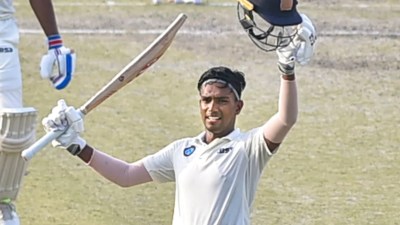Conversions belong to pre-modernity
During the recent debate on Prohibition of Forcible Conversion of Religion Bill in the Tamil Nadu Assembly the state’s chief minister, ...

During the recent debate on Prohibition of Forcible Conversion of Religion Bill in the Tamil Nadu Assembly the state’s chief minister, J. Jayalalithaa, not only argued against forcible conversions but against conversion per se.
She observed that ‘conversions create resentment among several sections and also inflame religious passions, leading to communal clashes’ — causing isolation of the converted. She also quoted Mahatma Gandhi’s insistence on the need to stop all proselytising activities.
Many commentators have seen her move as a violation of India’s secular credentials. But they overlook the important fact that her position has been the view articulated by most modern Indian thinkers from Rammohun Roy to Mahatma Gandhi.
Rammohun believed in religious pluralism, regarding conversion as alien both to the process of modern nation building and the spirit of pluralism based on the ideas of tolerance. This was reiterated by Ramakrishna, who held that all religions of the world provide different ways to realise the divine and a logical corollary of this was an acceptance that the best way to reach the divine was to follow one’s own faith.
Swami Vivekananda not only stoutly defended his message but also used religion to inspire nationalism and a sense of pride in India’s past.
Gandhi, too, repeatedly stressed on the ‘fundamental truth of all great religions of the world’ and earnestly pleaded with his followers to ‘remember that his own religion is the truest to every man even if it stands low in the scales of philosophical comparison’.
His encounter with missionaries in South Africa played a crucial part in the development of his ideas. Their willingness to discuss religious issues with Gandhi made him realise the importance of religion. He saw both positive and negative sides to their teachings.
On the positive side, he adopted the evangelical outlook that God guided people. He shared their belief that organisations like the Church and other voluntary associations should become instruments for reforming society and alleviating human miseries.
However, he could not reconcile to their narrow view that one particular religion alone could be true. He felt that this was their most serious limitation. He rejected religious conversion as an ethical failure for ‘to think that it was the duty of any religion to remove persons from another religion seemed to be a violation of the integrity of family and community relationships’.
The most important foundation of a modern democratic order is the separation of religion from the state, the former being strictly treated as a matter of private conviction. However, this separation does not mean that politics cannot involve religious institutions. Most modern Indian leaders knew the force of religion. Whether they were Swami Vivekananda or Maulana Azad, they rejected the contention that a particular religion is superior to others. The important point to note is that mass conversion has a pre-modern connotation as reflected by the Crusades. In India, the organised Hindu order drove out Buddhism. This happened in ancient times when stratification existed in all societies and religions.
The two major religious beliefs in India — Hinduism and Islam — flourished and consolidated before the beginning of the modern period. Akbar’s Din Illahi was an early attempt at accepting religious pluralism that would have found its full flowering if Dara Shikoh, Shah Jahan’s eldest son, had succeeded to the throne. He conceded that truth was not the monopoly of any one particular religion. In the 20th century, Azad carried forth this line of argument. He believed that, in the ultimate analysis, in spite of differences in modes of worship, all religions contained the same divine message of truth namely the advancement of moral good and surrender to God.
But Christianity in India had a different evolution. British colonialism and the activities of missionaries in India helped its pervasive influence. All the important leaders who laid the foundation of a modern secular India society and polity appreciated the work of Christian missionaries in education and society but rejected their efforts to convert.
The perception that all faiths are inherently one has validity not only in multi-religious and multi-cultural India today, but also in relatively more homogeneous societies. The world is no longer monolithic but pluralistic.
In this age of democracy and scientific rationality, the realm of faith is a matter of individual preference. Organised efforts at conversion, recalling the Crusades of yesteryear, is unwarranted and uncalled for.
The writer is a professor of political science, Delhi University
- 01
- 02
- 03
- 04
- 05































